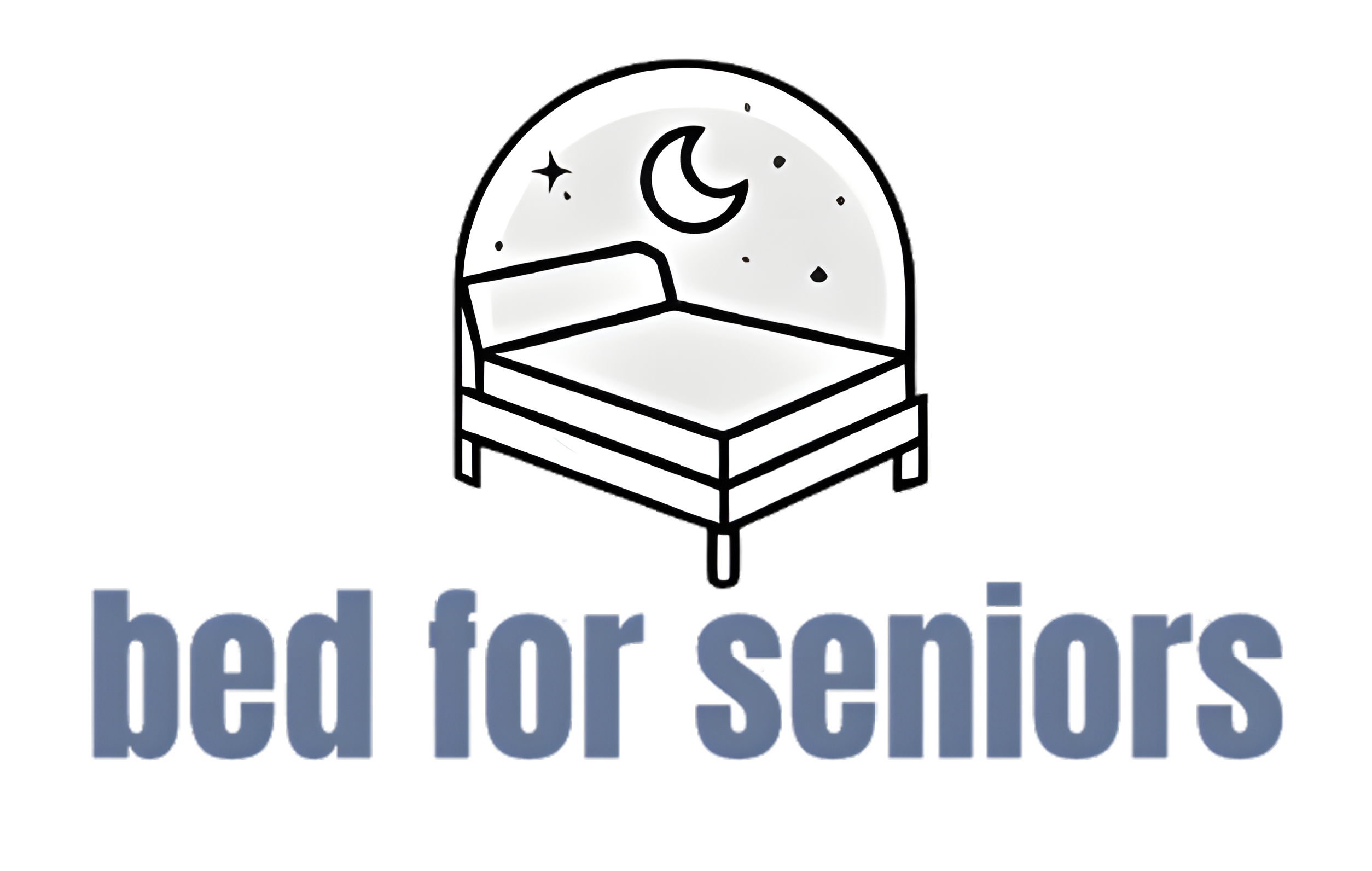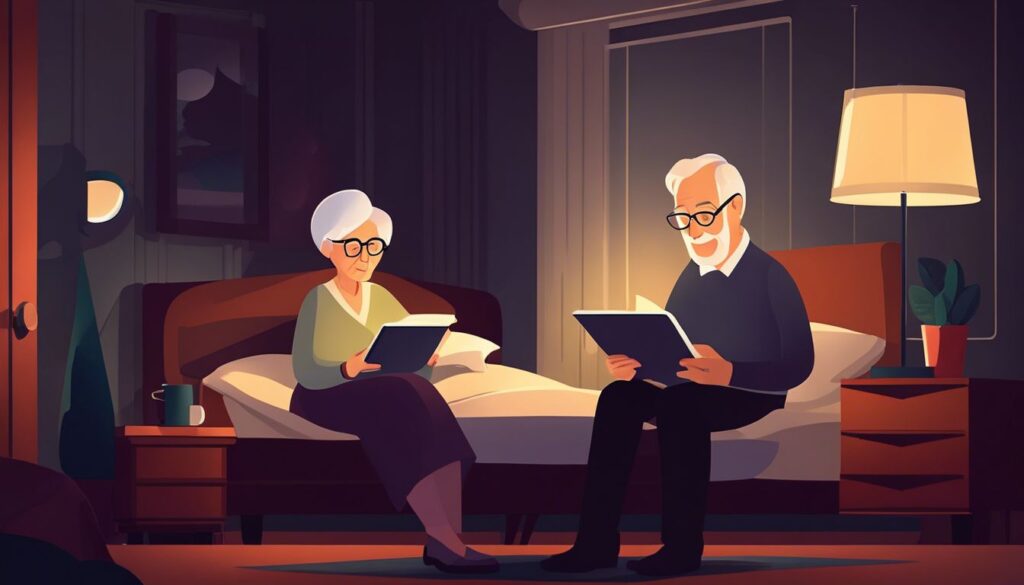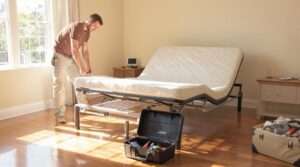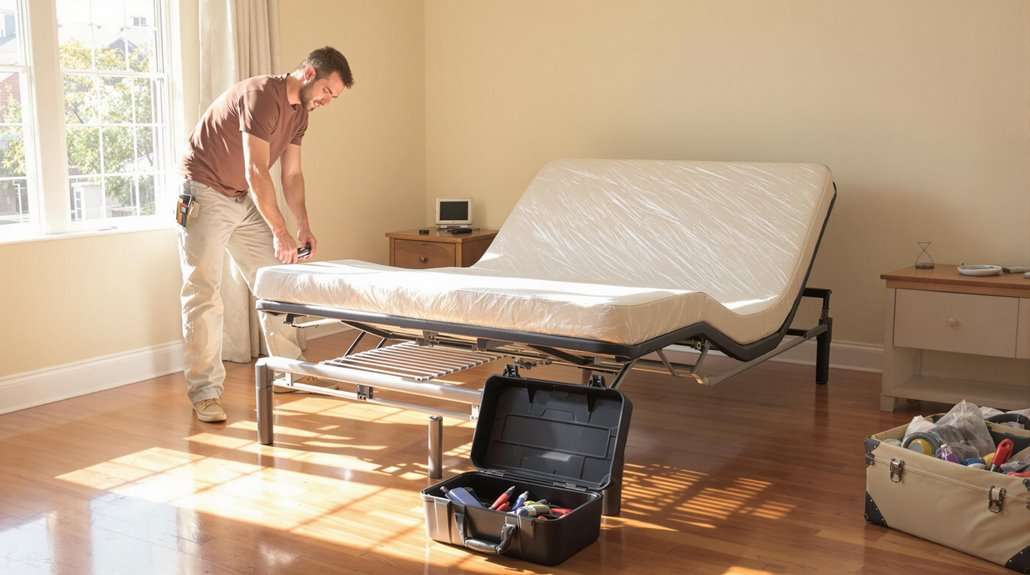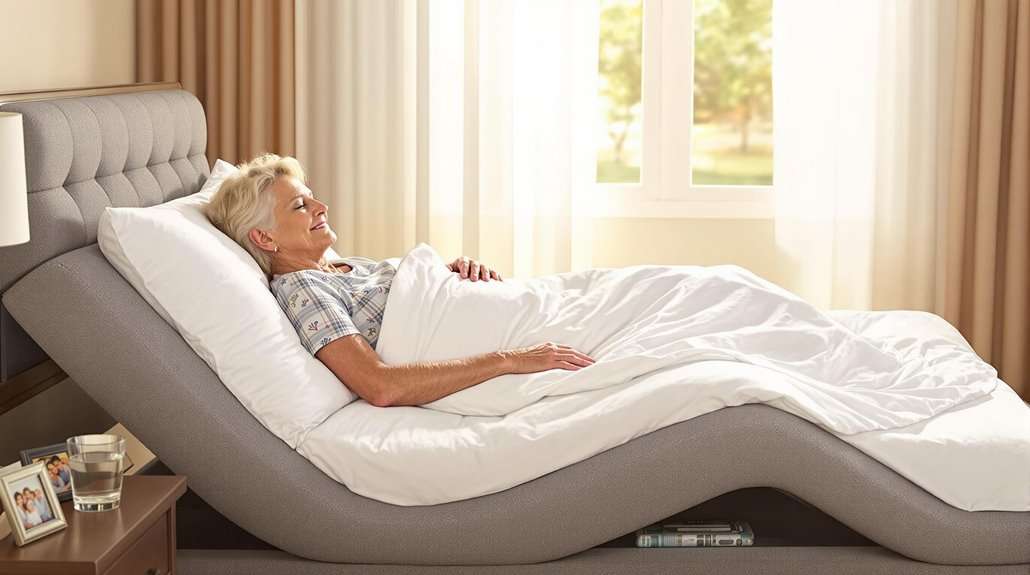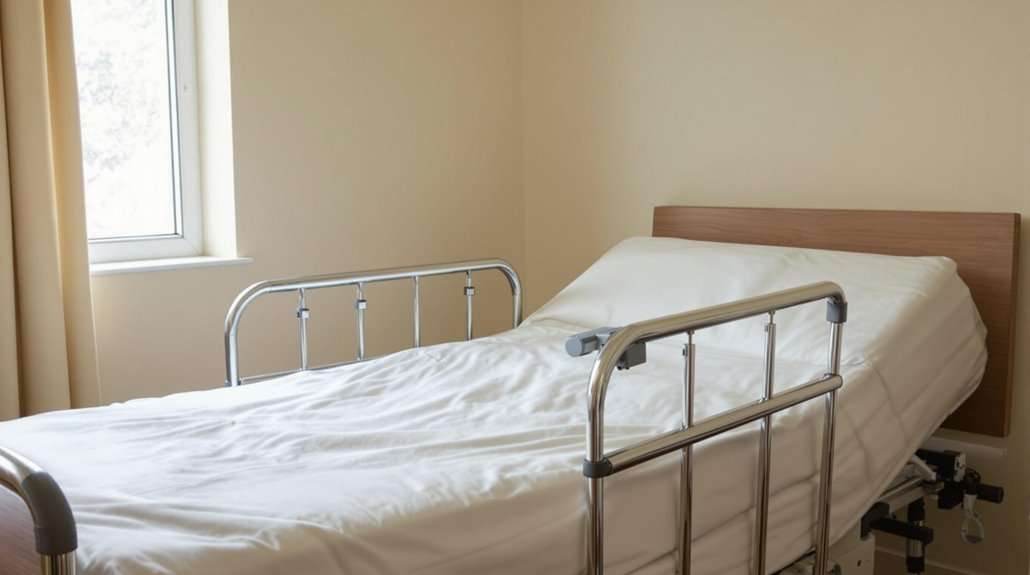Many seniors struggle with sleep issues, unsure if their problems are normal or cause for concern. A recent study involving 10 sleep experts identified and debunked 20 common sleep myths affecting older adults.
This blog post will separate fact from fiction, helping you understand senior sleep needs and improve sleep quality. Ready to bust some myths?
📋✅
- Seniors need 7-9 hours of sleep per night, just like younger adults, despite changes in sleep patterns with age.
- Persistent snoring in older adults can signal sleep apnea, a serious condition that needs medical attention.
- Over-the-counter sleep aids and alcohol can harm sleep quality and lead to health issues in seniors.
- Poor sleep quality often stems from underlying health conditions rather than aging itself.
- Creating a consistent sleep schedule, avoiding screens before bed, and using adjustable beds can improve seniors’ sleep.
Common Sleep Myths Affecting Seniors

Sleep myths can harm seniors’ health and well-being. These false beliefs often lead to poor sleep habits and missed warning signs of serious conditions.
Myth: Older People Need Less Sleep
Contrary to popular belief, older adults don’t need less sleep than younger people. This myth likely stems from changes in sleep patterns that occur with age. Seniors often experience lighter sleep and may wake up more frequently during the night, leading to the misconception that they require fewer hours of rest.
However, research shows that adults of all ages typically need 7-9 hours of sleep per night for optimal health.
Sleep quality, not just quantity, becomes crucial for older individuals. A meta-analysis reveals that older adults generally get less sleep than their younger counterparts. This sleep deficit can lead to various health issues, including increased risk of cardiovascular disease and cognitive decline.
Caregivers should encourage consistent sleep schedules and create environments conducive to restful nights for their elderly charges.
Fact: Seniors may experience changes in sleep patterns, but still require adequate sleep
Seniors’ sleep patterns often shift as they age. They might wake up earlier or have trouble staying asleep through the night. But these changes don’t mean older adults need less rest.
In fact, most seniors still require 7-9 hours of sleep each night for optimal health. Lack of proper sleep can lead to serious health issues. Not getting enough shut-eye is linked to weight gain, obesity, diabetes, and high blood pressure in older adults.
Sleep quality matters just as much as quantity for seniors. Deep, restorative sleep helps maintain cognitive function and emotional well-being. Caregivers should pay attention to signs of sleep disorders in their loved ones.
Persistent snoring, for instance, could indicate sleep apnea – a condition that needs medical attention.
Myth: Snoring is Harmless
Seniors’ sleep patterns may change, but they still need proper rest. This brings us to another common misconception about sleep in older adults.
Many people think snoring is just a harmless nuisance. It’s not. Loud snoring can signal serious health issues, especially in older adults. It’s often linked to obstructive sleep apnea (OSA), a condition where breathing stops and starts during sleep.
OSA can lead to high blood pressure, heart problems, and daytime fatigue. Caregivers should pay attention to their loved ones’ snoring habits. If it’s loud and frequent, it’s worth discussing with a doctor.
Early detection and treatment of sleep-related breathing issues can greatly improve a senior’s quality of life and overall health.
Fact: Persistent snoring can be a sign of sleep apnea, especially in seniors
Persistent snoring in seniors isn’t just a nuisance—it’s a potential red flag for sleep apnea. This condition interrupts breathing during sleep, leading to poor rest and serious health risks.
Caregivers should pay attention to loud, chronic snoring accompanied by gasping or choking sounds.
Sleep apnea is not just about snoring; it’s about breathing and overall health, says Dr. Sarah Johnson, sleep specialist.
OSA, or obstructive sleep apnea, is particularly common in older adults. It can result in fragmented sleep and other health complications if left untreated. Daytime sleepiness, morning headaches, and difficulty concentrating are other symptoms to watch for.
The next myth we’ll debunk is about napping and its role in senior sleep patterns.
Myth: Napping Makes up for Poor Nighttime Sleep
Napping doesn’t fully make up for poor nighttime sleep in seniors. While short naps can provide a quick energy boost, they don’t replace the benefits of a full night’s rest. Long or frequent naps may actually worsen nighttime sleep quality, creating a cycle of poor sleep patterns.
Habitual napping can lead to nighttime insomnia, disrupting the body’s natural sleep-wake cycle.
Seniors need consistent, quality sleep at night for optimal health. Instead of relying on naps, focus on improving nighttime sleep habits. This includes maintaining a regular sleep schedule, creating a comfortable sleep environment, and addressing any underlying health issues that may be causing sleep disturbances.
The next myth we’ll debunk relates to sleep aids and their safety for seniors.
Fact: While naps can help, they do not replace the need for continuous nighttime sleep
Naps can provide a quick energy boost for seniors, but they’re not a substitute for a full night’s rest. Short daytime naps—15 to 30 minutes—may help improve alertness and mood.
However, longer naps can interfere with nighttime sleep patterns, leading to fragmented rest and potential sleep debt. This disruption can worsen existing sleep problems and contribute to excessive daytime sleepiness.
Continuous nighttime sleep is crucial for seniors’ overall health. It allows the body to cycle through all sleep stages, including deep sleep and REM sleep. These stages are vital for memory consolidation, hormone regulation, and tissue repair.
Relying too heavily on naps can mask underlying sleep issues that need addressing, such as sleep apnea or circadian rhythm disorders. Caregivers should encourage seniors to maintain a consistent sleep schedule and address any persistent sleep problems with a healthcare provider.
Debunking Myths About Sleep Aids and Senior Sleep
Sleep aids for seniors often come with misconceptions. Many think over-the-counter pills are safe for long-term use. But these can lead to health issues and dependency in older adults.
Myth: Over-the-counter Sleep Aids are Safe for Regular Use by Seniors
Over-the-counter sleep aids may seem harmless, but they can pose serious risks for seniors. These medications often contain antihistamines, which can cause confusion, dry mouth, and urinary retention in older adults.
Long-term use may lead to dependency and increase the risk of falls – a major concern for the elderly.
Health professionals caution against regular use of these products by seniors. Instead, they recommend addressing underlying sleep issues through improved sleep hygiene and lifestyle changes.
For persistent problems, consulting a doctor about safer alternatives or cognitive behavioral therapy for insomnia is advisable. Caregivers should be aware of these risks and help seniors explore healthier sleep solutions.
Fact: Long-term use of sleep aids can lead to dependency and other health issues
Sleep aids might seem like a quick fix for sleep issues, but they come with risks. Long-term use can lead to dependency, where the body struggles to sleep without them. This dependency often results in needing higher doses for the same effect.
Beyond addiction, these medications can cause side effects like daytime drowsiness, memory problems, and increased fall risk in seniors.
Health experts warn against relying on sleep aids as a long-term solution. Instead, they recommend addressing underlying causes of sleep problems. This approach might include improving sleep hygiene, managing stress, or treating medical conditions that disrupt sleep.
For caregivers, it’s crucial to work with healthcare providers to find safe, effective ways to improve sleep quality in seniors without risking dependency or other health issues.
Myth: Alcohol Helps Seniors Sleep Better
Long-term use of sleep aids can lead to dependency, but there’s another common misconception about sleep that affects seniors. Many believe alcohol helps them sleep better. This myth is dangerous and misleading.
Alcohol doesn’t improve sleep quality for seniors. It disrupts the sleep cycle, leading to fragmented and less restful sleep. For older adults, this can worsen existing sleep issues.
Alcohol near bedtime interferes with the body’s natural sleep-wake regulation. It may cause more frequent nighttime urination, further disrupting sleep. Even more concerning, alcohol can exacerbate symptoms of sleep apnea in seniors.
This condition already impacts many older adults, and alcohol consumption can make breathing difficulties during sleep more severe. Caregivers should be aware of these risks and help seniors find healthier alternatives for better sleep.
Fact: Alcohol can interfere with the sleep cycle, reducing sleep quality
Contrary to popular belief, alcohol doesn’t improve sleep for seniors. It actually disrupts the sleep cycle, leading to poor quality rest. Alcohol may help someone fall asleep faster, but it prevents deep, restorative sleep later in the night.
For caregivers, it’s crucial to understand that one third of U.S. adults get less than the recommended 7 hours of sleep nightly. Alcohol consumption near bedtime worsens this issue, especially for those with sleep apnea.
It can cause more frequent awakenings, increased snoring, and less time in REM sleep – the stage vital for memory consolidation and emotional processing.
Impact of Sleep Quality on Senior Health
Sleep quality plays a crucial role in senior health. Poor sleep can lead to cognitive decline, increased fall risk, and weakened immune function in older adults.
Myth: Sleep Quality Declines are a Normal Part of Aging
Many caregivers believe that poor sleep quality is an inevitable part of aging. This myth often leads to overlooking treatable sleep issues in seniors. Research shows that health conditions, not age itself, typically cause disrupted sleep patterns in older adults.
Addressing these underlying health problems can significantly improve sleep quality for seniors.
Caregivers should be aware that one-third of Americans get the recommended amount of sleep, regardless of age. This statistic highlights that good sleep is achievable for seniors with proper care and attention to their specific needs.
Regular check-ups, managing chronic conditions, and creating a sleep-friendly environment can help maintain or improve sleep quality as people age.
Fact: Health conditions, not age, are often the cause of disrupted sleep
Contrary to popular belief, aging doesn’t automatically lead to poor sleep. Health issues, rather than age itself, often disrupt sleep patterns in older adults. Chronic conditions like arthritis, heart disease, or diabetes can cause discomfort and wake seniors during the night.
Sleep apnea, a common disorder in older adults, interrupts breathing and fragments sleep. Certain medications may also interfere with sleep quality.
Addressing underlying health problems can significantly improve sleep for seniors. Regular check-ups and proper management of chronic conditions help minimize nighttime disturbances.
For instance, treating sleep apnea with positive airway pressure devices can restore restful sleep. Adjusting medication schedules or exploring alternative treatments might reduce sleep-related side effects.
By focusing on overall health, caregivers can help seniors achieve better sleep duration and quality, leading to improved health outcomes and daytime alertness.
Myth: Daytime Sleepiness is Just Due to Aging
Daytime sleepiness isn’t an inevitable part of aging. Many seniors experience fatigue during the day, but this often signals underlying health issues rather than normal aging. Sleep apnea, medication side effects, or chronic pain can disrupt nighttime rest, leading to daytime drowsiness.
Caregivers should pay attention to changes in sleep patterns and consult healthcare providers if excessive sleepiness persists.
Addressing the root causes of daytime sleepiness can significantly improve a senior’s quality of life. Poor sleep hygiene, such as irregular bedtimes or napping too late in the day, may contribute to this issue.
Encouraging consistent sleep schedules and creating a restful bedroom environment can help combat fatigue. Regular exercise and limiting caffeine intake also promote better sleep health for older adults.
Fact: Excessive daytime sleepiness could indicate underlying health issues
Excessive daytime drowsiness in seniors isn’t just about feeling tired. It’s often a red flag for hidden health problems. Sleep apnea, a common issue where breathing stops and starts during sleep, can lead to constant fatigue.
Other culprits include depression, medication side effects, or even early signs of cognitive decline.
Caregivers should pay attention to patterns of sleepiness and discuss them with a doctor. A sleep study might reveal issues like insomnia or restless leg syndrome. Addressing these underlying causes can improve a senior’s quality of life and overall health.
Remember, good sleep is crucial – it affects memory, mood, and physical well-being.
Lifestyle Adjustments for Better Sleep in Seniors
Small changes in daily habits can make a big difference in sleep quality for older adults. Regular exercise, a consistent sleep schedule, and a relaxing bedtime routine can help seniors get better rest.
These simple steps can lead to more restful nights and energetic days.
Myth: Staying in Bed Longer Improves Sleep
Many caregivers believe that letting seniors stay in bed longer will help them sleep better. This is false. Spending too much time in bed can actually harm sleep quality. Research shows that sticking to a regular sleep schedule is more effective.
Seniors should aim to go to bed and wake up at the same time each day, even on weekends.
Lying in bed awake for long periods can lead to sleep loss and circadian desynchronization. Instead of extra bed time, seniors benefit from stimulus control therapy. This involves only going to bed when sleepy and getting up if unable to fall asleep within 20 minutes.
These techniques help train the body and internal clock for better sleep patterns.
Fact: Regular sleep schedules and avoiding prolonged time in bed can enhance sleep quality
Maintaining a consistent sleep schedule helps seniors improve their sleep quality. This means going to bed and waking up at the same time every day, even on weekends. Sticking to a routine helps regulate the body’s internal clock, making it easier to fall asleep and wake up naturally.
Caregivers should encourage seniors to limit time spent in bed when not sleeping. Lying in bed for extended periods can lead to fragmented sleep and daytime drowsiness.
Excessive time in bed often results in tossing and turning, which can increase stress and anxiety about sleep. Instead, seniors should get out of bed if they can’t fall asleep within 20 minutes.
They can engage in a calm activity like reading until they feel sleepy. This approach, known as stimulus control therapy, helps associate the bed with sleep rather than wakefulness.
The next section will explore how screen time before bed affects senior sleep patterns.
Myth: Watching TV Helps Seniors Wind Down Before Bed
Many caregivers believe TV helps seniors relax before bed. This myth can harm sleep quality. Blue light from screens disrupts the body’s natural sleep-wake cycle. It suppresses melatonin production, making it harder to fall asleep.
Instead of TV, encourage seniors to read a book or listen to soft music. These activities promote relaxation without interfering with sleep hormones. Creating a calm bedtime routine can significantly improve sleep quality for older adults.
Next, let’s explore how adjustable beds can benefit seniors’ sleep.
Fact: Exposure to screens can interfere with the ability to fall asleep
Screens emit blue light, which can disrupt the body’s natural sleep-wake cycle. This light suppresses melatonin production, a hormone crucial for regulating sleep patterns. Caregivers should encourage seniors to avoid smartphones, tablets, and TVs at least an hour before bedtime.
Instead, suggest relaxing activities like reading a book or listening to soft music.
Creating a bedtime routine without screens can significantly improve sleep quality for seniors. Dim lighting and comfortable bedding help create a sleep-friendly environment. The next section will explore how adjustable beds can further enhance sleep comfort for older adults.
Benefits of Adjustable Beds for Seniors
Adjustable beds offer significant advantages for seniors, enhancing both comfort and sleep quality. These specialized beds allow users to modify their sleeping position, which can alleviate health issues common in older adults.
For instance, elevating the head slightly may reduce snoring and ease breathing difficulties. Raising the legs can improve circulation and reduce swelling – a boon for those with edema or varicose veins.
Seniors with acid reflux or GERD find relief by sleeping with their upper body slightly elevated. This position helps keep stomach acid from flowing back into the esophagus. Adjustable beds also make it easier for older adults to get in and out of bed safely, reducing fall risks.
The ability to change positions throughout the night without physical strain promotes better sleep and less discomfort for those with arthritis or joint pain.
Debunking sleep myths helps seniors and their caregivers make informed choices about rest. Armed with facts, older adults can take steps to improve their sleep quality. Better sleep leads to better health outcomes and a higher quality of life for seniors.
Remember, good sleep habits are crucial at any age. Consult a doctor for personalized advice on achieving restful nights.
Related Questions
1. Do seniors need less sleep than younger adults?
No, this is a myth. Seniors need just as much sleep as younger adults. The Sleep Foundation says adults of all ages should get 7-9 hours of sleep each night. Insufficient sleep can lead to health problems and difficulties with focus.
2. Is it normal for older adults to have trouble falling asleep?
While some changes in sleep patterns are common with age, difficulty falling asleep isn’t normal. Sleep-related disorders like insomnia can affect seniors. If you’re having trouble sleeping, talk to a doctor who specializes in sleep medicine.
3. Can exercising before bed help seniors sleep better?
Exercising close to bedtime can make it harder to fall asleep. It’s best to finish workouts at least a few hours before bed. Regular exercise during the day, however, can improve sleep quality and help reset your body clock.
4. Are naps bad for nighttime sleep in older adults?
Short naps (15-30 minutes) during the day can be helpful for seniors. But long naps or napping late in the day can disrupt nighttime sleep. If you enjoy a siesta, keep it brief and early in the day.
5. Does alcohol help seniors sleep better?
While alcohol might make you feel sleepy, it actually disrupts sleep patterns. It can reduce REM sleep and cause you to wake up during the night. For better sleep, avoid alcohol close to bedtime.
6. Is snoring just a normal part of aging?
Snoring isn’t a normal part of aging. It can be a sign of sleep apnea, a serious sleep disorder. If you or your partner snores loudly or stops breathing during sleep, see a doctor. Proper treatment can improve sleep quality and overall health.
